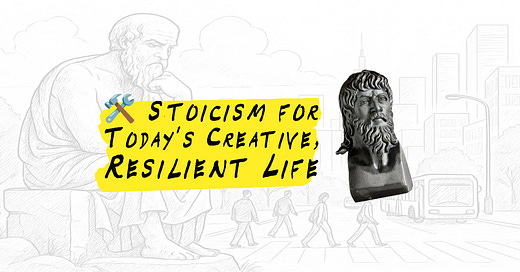🛠 Stoicism for Today’s Creative, Resilient Life
Lessons from Ancient Rome’s Answer to Socrates
Today, resilience is one of those buzzwords we hear everywhere. I am yet to be convinced that some people (*cough* influencers) understand the meaning of it. Yet Musonius was teaching it two millennia ago.
Hi all,
Today’s post is an essay on the Roman Stoic Musonius Rufus that maintains an extremely practical focus throughout, with advice on how we might apply the lessons from this ancient teacher to our modern everyday lives.
It’s a guest post, and comes courtesy of
.I hope you enjoy and find it useful.
All the best,
Allan
More about Enda:
Enda Harte (The Irish Stoic) is Music Tech Strategist and Artist Manager, from Ireland. He writes online and in print about Stoicism and other Ancient Insights in order to live a grounded, well meaning life.
The Irish Stoic Newsletter: endaharte.substack.com
Other work: endaharte.net
Stoicism for Today’s Creative, Resilient Life
Before self-help became a billion-euro industry, there was Musonius Rufus – a man who believed your character mattered more than your comfort. He was a first-century Roman Stoic, had an apprentice called Epictetus, and was a man of action who appears to have lived what he taught.
As one scholar notes, Musonius “conceived of philosophy as nothing but the practice of noble behavior,” insisting that we must “live for virtue, not pleasure.” In other words, the point of philosophy isn’t to win arguments or chase feel-good moments; it’s to train yourself in self-discipline, integrity and wisdom.
I find it inspiring that Musonius even walked this talk – he kept a simple vegetarian diet and wore plain, cheap clothes to strengthen both body and soul, aiming for “a good, sturdy life”. Today, as creatives and everyday people juggling hustle culture, self-doubt and endless distractions, we can look to Musonius for some no-nonsense guidance.
If you're anything like me, navigating the chaos of deadlines, creative slumps, trying to eat better, avoid the news, brain rot and maybe even wondering what the point of all this is, then Musonius' voice cuts through the noise like a tuning fork. His teachings aren’t academic or stiff. They’re streetwise, tough, and strangely kind by nature.
Fundamental Resilience
Today, resilience is one of those buzzwords we hear everywhere. I am yet to be convinced that some people (*cough* influencers) understand the meaning of it. Yet Musonius was teaching it two millennia ago. He lived it; forced into exile under Nero and later by Vespasian, he found ways to stay focused on what mattered.
In the barren scrap of rock where he was sent, he set up a mini “Stoic bootcamp”, meditating on virtue, practicing endurance, and even teaching others who were exiled with him. He didn’t collapse or complain (at least not publicly); and instead doubled down.
When I think of this type of hardship or exile, I picture things closer to everyday life, like a struggling artist grinding out guitar riffs in a freezing, drafty studio – and suddenly it resonates. As Musonius pointed out in another lecture, people often choose all kinds of voluntary suffering for the wrong reasons (a caffeine addiction, a lifestyle of partying), but balk at the small disappointments that build virtue.
He asks, why endure discomfort for pleasure, but squeal when it’s for growth or moral duty? I suppose it’s like earning money vs. learning to want less money. This echoes cognitive therapies that turn our reaction to adversity and stressors into training, rather than sheer terror.
Musonius believed hardship wasn’t a tragedy. It was training. That thing you're going through right now? The low-level anxiety, the failed friendship, or the project that didn’t get picked up? That’s your practice round. It’s an opportunity to lean into it. Calmly, and with dignity.
The Secret Sauce Is Simplicity
In a world obsessed with more, well, everything, Musonius’s voice is refreshingly blunt: possessions and indulgence weaken us. For instance believing the point of food is to nourish, not to indulge taste buds, and mastering appetite is “the basis for self-control, a vital virtue”. That being said, don't starve yourself for the sake of virtue alone.
There’s an argument that people who eat plain, simple food can work harder, recover faster and withstand discomfort better than those spoiled by gourmet meals. “Those who eat the least expensive food can work harder…tolerate cold, heat, and lack of sleep better… and are generally stronger.”
He applied the same logic to clothing and comfort. Musonius recommended wearing modest, inexpensive clothes and even feeling a bit cold on purpose. He reasoned we should dress only for protection, never to pamper ourselves. Go barefoot if you can, he said. This sounds extreme, but it was deliberate training.
Note: Barefoot shoes are great for this without going all out, I’ve been using them for years and notice significant differences in my foot health.
If you want to toughen your character, ditch the heated car seat and burden the senses a bit more. In modern life, think of this as influencing your environment for strength. Skip the endless scrolling before bed; turn off the air conditioning when it’s just not needed; minimise your gadget addiction across the spectrum.
Just as Musonius ate coarse porridge instead of feasts, we might trim our “appetites” for the new phone or designer gear and cars. It doesn’t mean renouncing all pleasure. It means not letting comfort be your master.
Practice Is the Point
Musonius believed that philosophy must be practical – it’s the ultimate self-improvement programme. “We do not study philosophy for the sake of talking about it, but for the sake of living according to its precepts”. In other words, don’t just quote Stoic maxims on Substack or talk about practicing an instrument that’s gathering dust. Turn principle into action.
For modern creatives, this translates to the “practice daily” rule which is super familiar in the self development world. Write lyrics at dawn, do that guitar finger exercise, or draft that business plan in fragments on your commute. These mundane labs are mental workouts.
Every refusal of distraction is a moment of clarity. Every routine we stick to builds self-discipline. By making small sacrifices now, (think a colder shower, finishing one more paragraph, or going out for a walk in the rain, yes even when tired) we exercise courage, wisdom and perseverance.
Self-control, to Musonius, was the ultimate freedom. For instance, rather than impulsively checking social media, imagine using that time to sketch, rehearse or meditate. The Stoic self is like a musician who keeps practicing even without applause because we know the real reward is internal growth. What we do sincerely counts more than what we say. His formula was simple: train your habits over time, and virtue will follow.
Virtue and Integrity Above All Else
At the heart of all this discipline talk is virtue and integrity. The Stoics insisted that virtue – courage, justice, temperance, wisdom – is the only true good. Everything else (wealth, reputation, pleasure) is “indifferent,” neither inherently good nor bad. These practices and ethical teachings are for everyone, men, women and children alike.
So the quality of your character and how you treat others is the bedrock of a good life. Musonius was ahead of his time in saying a wife, friend, or colleague who’s philosophically trained will manage life’s challenges nobly. Virtue isn’t about titles or flashy careers, it’s about how we behave in the small moments.
Seneca the Younger, the millionaire Stoic was Musonius’s contemporary in some ways, and even he advised Emperor Nero by Stoic principles, which unfortunately didn’t end too well for all involved.
Musonius stood up to emperors too, preaching ethics even when it was dangerous. He rejected bribery and flattery in favour of moral consistency. No employer or algorithm should ever pull us from our compass of what’s right.
What Do We Do With This?
How do all these lessons add up in 2025? First, accept that Stoicism isn’t just for CEOs and bodybuilders; it’s for anyone dealing with overdue bills, auditions or breakups. Life isn’t going to slow down, the inbox will keep filling and the algorithms will keep pulling. But you get to decide how you approach this.
When apps and news outlets distract you, practice ignoring them (resist the ping!). Notice that most of what stresses us – social pressure, judgment, envy – Musonius would call a useless luxury. This is painful to execute at first, but you will become mentally resilient because of it.
And for my creative friends, struggling for inspiration, don’t panic. A sculptor chiseling in rain becomes better at patience and timing. An engineer debugging code late at night learns persistence. All great work was forged in discomfort as much as in breakthroughs. Musonius would remind us that “every good is gained by toil” and although the toil ends, the good remains.
Unlike a quick thrill, the satisfaction of a job well-done lingers. So next time you’re tempted to binge or bail, remember that a disciplined yes today is a strong advantage for your future self. Creative genius and outright talent alone won’t take you to where you want to go.
Closing Thoughts
I’ll admit, channeling a long dead Roman sage can feel a bit odd in our world today. But spending time with Musonius’s ideas has made me rethink what really matters. When life piles on stress, it’s empowering to remember – as he did – that the only true failures are moral ones.
Late-night doubts fade a bit when I remember what he taught, choose the path that’s right, even if it’s the lonely one, because those choices shape us.
These teachings help guide us without shortcuts. Demanding honesty, grit, simplicity and heart – all everyday virtues disguised as old-school discipline. Clearing away unnecessary clutter (in my schedule, diet, or ego) has given me more space for real creativity. When hardship in any form knocks, I try to recall his words of wisdom, as I do with all the Philosophers I read. I don’t always succeed by the way, but each time I do, it feels like a huge personal win.
In the end, Musonius reminds us that philosophy is not just history or sayings to regurgitate, it’s a life practice. He shows us that living simply and uprightly – in art, work or relationships – is itself a path to contentment, that old Eudaimonic living they always talk about.
As we juggle through turbulent times across the world, and then some, we can borrow ancient wisdom like this by building resilience through challenge, training your mind like a muscle, and by letting virtue, not fleeting pleasure or approval be your guide.
Exercise what free will you have at your disposal.
Memento mori.
Selected Sources:
Musonius Rufus: Lectures and Sayings
Internet Encyclopedia of Philosophy
A Guide to the Good Life by William Irvine
Musonius Rufus biography by Enda Harte
World History Encyclopedia – Musonius Rufus








Thank you for having me on your blog. A pleasure as always. I hope your readers enjoy and find something valuable from this writing.
Excellent post as always. This article does a great job explaining why Musonius is my favorite philosopher. Socrates taught us how to question, Musonius taught us about training virtue through action. Voluntary discomfort in order to train the skills of virtue is an incredibly empowering concept that can improve anyone’s life across domains. Good stuff guys